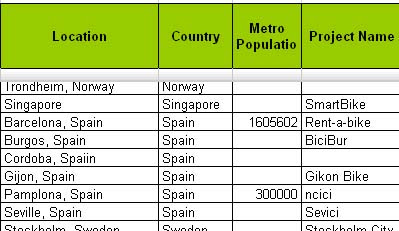
On a snowy Thursday evening this past week, over 400 Philadelphians converged at the Academy of Natural Sciences in Center City to discuss a concept that's taking North America and the world by storm, bike-sharing, naturally. The capacity crowd listened to representatives of the Bicycle Coalition of Greater Philadelphia, who were co-sponsors of the event, and Mayor Michael Nutter, a supporter of green transport, welcome attendees and introduce the evening's speakers. This event in all likelihood was the first bike-sharing conference to be held in the United States. An historic moment.
Speakers at the event included Gilles Vesco, Vice-président Communauté urbaine de Lyon, who oversees the municipal government’s Velo'v; Nate Kvamme, Director of Humana’s Innovation Center, who assisted in developing their Freewheelin' program which is a high-tech bike fleet available for employee use at their headquarters in Louisville, Kentucky; and Mitch Franzos of Friends of the Riverfront, who with Dasani, piloted a high-tech recreational bike rental program called Blue Bikes in Pittsburgh, Pennsylvania.
Philadelphia, or Philly as the city is known to its residents and others with an affinity for the place, is the perfect location for a bike-sharing program. One of North America's oldest cities, with many narrow streets, Philly feels like an older European city set on a grid street network. These narrow streets would be ideal to convert into bicycle boulevards, or bicycle-priority streets, with bike-sharing stations placed every two blocks. According to a co-organizer, Alex Doty, nearly a third of Philadelphia residents don't own cars. In addition, Philly is a university town with the University of Pennsylvania, Drexel, Temple, and a host of other institutes of higher education, so the potential success for bike-sharing in Philly is enormous.
This kick-off event, which also included a more technical session the following morning directed toward Philadelphia government planners and engineers, was to show the public's support behind bike-sharing. Everything from the Website, poster to encourage event attendance, knowledgeable speakers, to the Take Action Webpage were well done. The Take Action page was created to further the voice of the event participants with an email to bikeshare@phila.gov which is collecting emails on the subject for the Philadelphia government. The event organizers understood how to hold a solid event and use the energy towards pushing for bike-sharing and make it happen now rather than waiting for it to simply happen in the distant future. I advise proponents of bike-sharing in other cities to use Philly's event as a model in developing their own local event.
As Gilles Vesco reported from Lyon's mayor, "There are two types of mayors - those who have bike-sharing and those who want bike-sharing." Mr. Vesco reported that bike traffic is up 80% in 2.5 years since Velo'v was launched and 25% of this increase is from bike-sharing. The remainder of the increase is from an increase in the use of private bikes. With safety in numbers, Lyon residents are all biking more. In fact, every day 40,000 km are biked on Velo'v which is the distance around Earth. While in Paris, with the much larger Velib', a trip around Earth is made every 1 hour 24 minutes.

As Nate Kvamme from Humana, a health benefits provider, said, "You often don't have a choice with your employer-provided health care benefits, but you do have a choice with your health." This statement hit the nail on the head and I have a feeling that within a short time from this conference, Philadelphia will have its own bike-sharing program up-and-running. This will create a greener Philadelphia with less traffic congestion, a healthier environment, and healthier populace.
image credit: Bike Share Philadelphia for the poster, cycling around Earth graphic from JCDecaux, and Andy Dyson of Neighborhood Bike Works for the video









